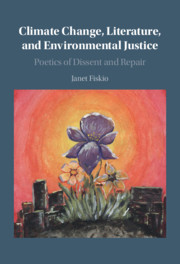Book contents
- Climate Change, Literature, and Environmental Justice
- Climate Change, Literature, and Environmental Justice
- Copyright page
- Dedication
- Contents
- Acknowledgments
- Introduction “A Fault Line of Pain”
- Chapter 1 “Fear of a Black Planet”
- Chapter 2 Ghosts and Reparations
- Chapter 3 Mapping and Memory
- Chapter 4 “Bodies Tell Stories”
- Chapter 5 Round Dance and Resistance
- Chapter 6 “Slow Insurrection”
- Chapter 7 Cannibal Spirits and Sacred Seeds
- Epilogue “Everyday Micro-utopias”
- Works Cited
- Index
Chapter 6 - “Slow Insurrection”
Poetics and Practice of Social Care
Published online by Cambridge University Press: 13 April 2021
- Climate Change, Literature, and Environmental Justice
- Climate Change, Literature, and Environmental Justice
- Copyright page
- Dedication
- Contents
- Acknowledgments
- Introduction “A Fault Line of Pain”
- Chapter 1 “Fear of a Black Planet”
- Chapter 2 Ghosts and Reparations
- Chapter 3 Mapping and Memory
- Chapter 4 “Bodies Tell Stories”
- Chapter 5 Round Dance and Resistance
- Chapter 6 “Slow Insurrection”
- Chapter 7 Cannibal Spirits and Sacred Seeds
- Epilogue “Everyday Micro-utopias”
- Works Cited
- Index
Summary
In “Slow Insurrection” I bring Mark Nowak’s documentary poetics into conversation with relational aesthetics and dissent encampments to explore the emergence of new democratic forms at the interstices of neoliberal capitalism. In Coal Mountain Elementary, Nowak makes coal miners and their labor central as agents in a project of radical history. In the facilitation of workshops in the Worker Writers School, as described in Social Poetics, writing is a site of political theorizing about labor and precarity. Following the discussion of Nowak’s work, I turn to Jacques Rancière’s theorization of aesthetics and politics and Nicolas Bourriaud’s Relational Aesthetics to think about dissent encampments. I examine the ways that Occupy made the imagination of more just, caring, and sustainable social institutions part of the practice of inhabitation and central to its challenge to the political and economic institutions of neoliberalism. I argue that these inhabitations offered examples of Bourriaud’s “microutopias”: ephemeral futures in the interstices of global capitalism. Occupy embraced disruption and favored what Rancière calls “dissensus” over consensus. In the last part of the chapter I bring together the social practice of poetry with the encounter of relational aesthetics, illuminating the power of both literary texts and artistic interventions to offer new modes of democratic process.
Keywords
- Type
- Chapter
- Information
- Climate Change, Literature, and Environmental JusticePoetics of Dissent and Repair, pp. 141 - 161Publisher: Cambridge University PressPrint publication year: 2021

